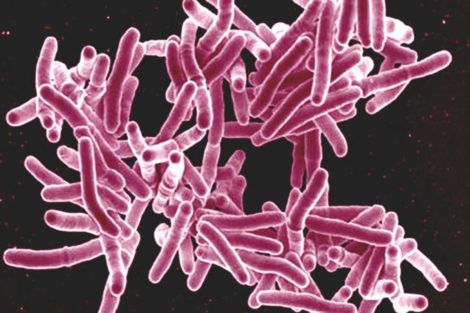October 8, 2019 – Tuberculosis is a major health problem worldwide. More than 1.5 million people died from it last year, making it the leading infectious killer on the planet. Another 10 million people fell ill with the disease, which is caused by Mycobacterium tuberculosis, a contagious airborne bacterium that can spread from person to person.
To date, vaccination has failed to stop the epidemic. The existing TB vaccine, known as BCG, protects babies against TB meningitis, but in its current form, BCG does not protect adults against lung disease, which is how the infection is spread. An effective vaccine for M. tuberculosis would save countless lives, but there are many technical and scientific obstacles and progress has been slow.
In order to advance the understanding of protective immune responses against M. tuberculosis and the development of an effective vaccine, the National Institute of Allergy and Infectious Diseases, part of the National Institutes of Health, has established three new research centers called “Immune Mechanisms of Protection Against Mycobacterium tuberculosis(IMPAc-TB) Centers.” The new contract awards, to which the NIH has committed $30 million in first-year funding, will provide up to seven years of support.
The NIH recently announced that the contract for one of these centers was awarded to Harvard T.H. Chan School of Public Health. Research at this center will be led by Sarah Fortune, John LaPorte Given Professor of Immunology and Infectious Diseases at Harvard T.H. Chan School of Public Health, JoAnne Flynn, professor at the University of Pittsburgh, and Henry Boom, professor at Case Western Reserve University. The highly collaborative and interdisciplinary team also includes research groups at the Ragon Institute, Massachusetts Institute of Technology, Boston University, University of Massachusetts Medical School, University of Washington, Imperial College London, University of Cape Town, and Makerere University in Uganda.
The Harvard Chan School IMPAc-TB Center led by Fortune, Flynn, and Boom will use cutting edge technologies to understand the immune responses that provide protection against TB infection and disease in humans and then translate these findings to experimental models where they can be more rapidly advanced.
“Many new technologies like single cell transcriptional profiling or T cell receptor sequencing are transforming our understanding of diseases, such as cancer, that are common in the United States but never benefit diseases that affect resource-limited countries,” Fortune said. “Through our IMPAc-TB Center, we will be able to bring this arsenal of systems immunology approaches to bear on TB.”
Fortune anticipates that this work will identify the features of an immune response that protects against disease. These factors could serve as sign posts for measuring the efficacy of experimental vaccines in the future. The research could also lead to new targets for experimental TB vaccines.
This project has been funded by the National Institute of Allergy and Infectious Diseases, National Institutes of Health, Department of Health and Human Services, under Contract 75N93019C00071.
photo: NIAID
